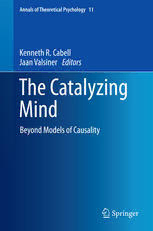
The Catalyzing Mind: Beyond Models of Causality PDF
Preview The Catalyzing Mind: Beyond Models of Causality
The Catalyzing Mind Annals of Theoretical Psychology SeriesEditors: CraigW.Gruber,NortheasternUniversity,Boston,MA,USA JaanValsiner,ClarkUniversity,Worcester,MA,USA MatthewG.Clark,UnitedStatesMilitaryAcademyatWestPoint,NY,USA SvenHroarKlempe,NorwegianUniversityofScienceandTechnology,Trondheim, Norway TheAnnalsof TheoreticalPsychologyisdevotedtounderstandingtheoreticaldevel- opmentsandadvancesinpsychologicaltheory.Thisseriesisdesignedtofurtherthe dialogueontheoreticalissuesinthefieldofpsychologyandtounifythediscipline throughatheoreticalsynthesisofideasonkeyissuesofdebate.Corethemesofthe Annalsvaryfromonevolumetoanother,movingbeyondafocusononeparticular aspect or approach to theory. Each book consists of invited and submitted papers andcommentariesthatexploreafacetofinnovativetheoryinpsychology.Ofpartic- ularinterestismovingthediscussionandexplorationoftheoryintoapplicationfor useinresearch, practiceandteaching, takingintoaccounttheglobalizednatureof contemporarypsychology. Theenduringobjectiveof theAnnalsof TheoreticalPsychologyistheexploration of key concepts that require further inquiry, dialogue, and theoretical integration withinpsychologyandrelatedfields. Forfurthervolumes: http://www.springer.com/series/5627 Kenneth R. Cabell • Jaan Valsiner Editors The Catalyzing Mind Beyond Models of Causality 2123 Editors KennethR.Cabell JaanValsiner ClarkUniversityDepartmentofPsychology NielsBohrProfessorshipCentre Worcester ofCulturalPsychology Massachusetts AalborgUniversitet USA Aalborg Denmark ISBN978-1-4614-8820-0 ISBN978-1-4614-8821-7(eBook) DOI10.1007/978-1-4614-8821-7 SpringerNewYorkHeidelbergDordrechtLondon LibraryofCongressControlNumber:2013951786 © SpringerScience+BusinessMediaNewYork2014 Thisworkissubjecttocopyright.AllrightsarereservedbythePublisher,whetherthewholeorpartofthe materialisconcerned,specificallytherightsoftranslation,reprinting,reuseofillustrations,recitation, broadcasting,reproductiononmicrofilmsorinanyotherphysicalway,andtransmissionorinformation storageandretrieval,electronicadaptation,computersoftware,orbysimilarordissimilarmethodology nowknownorhereafterdeveloped.Exemptedfromthislegalreservationarebriefexcerptsinconnection withreviewsorscholarlyanalysisormaterialsuppliedspecificallyforthepurposeofbeingenteredand executed on a computer system, for exclusive use by the purchaser of the work. Duplication of this publicationorpartsthereofispermittedonlyundertheprovisionsoftheCopyrightLawofthePublisher’s location,initscurrentversion,andpermissionforusemustalwaysbeobtainedfromSpringer.Permissions forusemaybeobtainedthroughRightsLinkattheCopyrightClearanceCenter.Violationsareliableto prosecutionundertherespectiveCopyrightLaw. Theuseofgeneraldescriptivenames,registerednames,trademarks,servicemarks,etc.inthispublication doesnotimply,evenintheabsenceofaspecificstatement,thatsuchnamesareexemptfromtherelevant protectivelawsandregulationsandthereforefreeforgeneraluse. While the advice and information in this book are believed to be true and accurate at the date of publication,neithertheauthorsnortheeditorsnorthepublishercanacceptanylegalresponsibilityfor anyerrorsoromissionsthatmaybemade.Thepublishermakesnowarranty,expressorimplied,with respecttothematerialcontainedherein. Printedonacid-freepaper SpringerispartofSpringerScience+BusinessMedia(www.springer.com) Annals of Theoretical Psychology: A Reintroduction As professors and researchers of psychology, we are often asked, “What is Psy- chology?” We generally reply, “Psychology is the scientific study of behavior and mentalprocesses.”Thisanswer,veryproperanddirect,speakstotheirinquiry,but itleavesroomfordiscussionanddebate.Bydefinition,thescientificstudy,analysis, andunderstandingofhumanbehaviorexplainsitsessentialcomponents,butitdoes notcompletelyaddresstheepistemologyofthediscipline—apointuponwhichfew seemtoagree.AsarguedbySmedslund(1991),psychologyisbecomingmoreand more“pseudoempirical,”andtherefore,webelievethatatheoreticalfocusneedsto bere-introducedintothediscussionofmodernpsychology. Thedesireandnecessityofreintroducingtheoryinpsychologyisnotanewone, as one can see from the prior editions ofAnnals ofTheoretical Psychology. From JosephRoyce’sinitialworkputtingtogetherVolume1ofthisseriesin1984tothe mostrecenteditionbyvanGeert,Mos,andBakerin1995,athoughtfulandthorough explorationoftheroleoftheoryinpsychologyhastakenplace.Certainly,weregret the delay as the discipline has not stood still in the almost 20 years since that last volume.ItisinthislightthatweenthusiasticallyreintroducetheAnnalsof Theoreti- calPsychologyasanannualpublicationthatwilladdresstheneedforgreaterdialog acrosspsychologicalperspectives,sub-disciplines,theorists,andmethodologies.It isourintentthatbydrivingreasoneddialogandconstructivedebaterelatedtoimpor- tanttopicsinpsychology, wewillstimulatefurtherinquiryofcentral, overlooked, orcomplexpsychologicalprinciples. OurgoalinrevivingtheAnnalsofTheoreticalPsychology istoexpandandex- ploreontological,epistemological,andmethodologicaldebates(amongothers)and attempttoprovideaforumfordiscussingwhatpsychologyiswhatisthefocusofits study,andhowonecanstudyitsphenomena.Furthermore,therevivalofthisseries attemptstofocusonconstructing,fromtheaforementioneddebates,exactlyhowto proceedwiththedevelopmentoftheoryanditsapplications.Despitevarious“crises inpsychology”(Teo,2005),todatetheroleoftheoryinpsychologyhasnotrisento theforefrontinanyappreciablemanner. Theneedforanannualpublicationontheoreticalpsychologyatthistimeissig- nificant.Asanexample,intheUnitedStates,psychologyisacoresciencethathas onlygrowninimportancesinceitsacceptanceasanacademicdiscipline.Oneneed v vi AnnalsofTheoreticalPsychology:AReintroduction only look to the daily news to see that many of the issues of today focus on the humandimensionandthehumancondition. However, despiteitsgrowthasacore science,ithasbecomefracturedandhighlyspecialized(anoldproblemidentifiedby Vygotsky, as summarized by Hyman, 2012). The result is that each sub-discipline developsitsownlanguageandapproachwheretheconceptscannolongeroperate to explain the entirety of the human experience, even though they seek to explain similarbehavioralormentalprocesses. Inordertobeginfromcommonground,theOxfordEnglishdictionarydefinesthe- oryas,“asuppositionorasystemofideasintendedtoexplainsomething,especially onebasedongeneralprinciplesindependentofthethingtobeexplained:—asetof principlesonwhichthepracticeofanactivityisbased:atheoryofeducation|[mass noun]: music theory.—an idea used to account for a situation or justify a course of action: my theory would be that the place has been seriously mismanaged.— (Mathematics)acollectionofpropositionstoillustratetheprinciplesofasubject” (OxfordUniversityPress,2010).Fromthissetofdefinitionstheroleoftheoryinits applicationtopsychologycanbeclearlyseen. Itisinthislightthatwere-launchtheAnnalsof TheoreticalPsychology.Theoret- icalpsychology,asweseeit,isnotlimitedtobasicorappliedscience.Theoretical psychologyisaboutthesuppositionorsystemofideasthathelpssparkdebateand moveourdisciplineforwardinaunifiedfashion.Additionally,throughthisdebate,a moremeaningfulunderstandingwilldevelop.Moredirectly,theoreticalpsychology isaboutidentifyingproblemsorshortagesinoursharedunderstandingofthehuman experienceandexploringhowthesegapsareaddressedthroughscienceandthestate oftheart. For example, arguably the most famous psychologist (or infamous depending onone’sperspective)inhistoryisSigmundFreud.Histheorieshavebeensimulta- neouslycontentious(e.g.,Grünbaum,1986)andusefulforsomeastherootsofhis theoryarestillemployedbythousandsofpsychoanalytictherapistsaroundtheworld. However,whydohistheoriesworkforsomeandnotforothers?Canweunderstand the basic science, application, and theoretical underpinnings so that development andgrowthcanoccurrelativetothistheory? Likewise, incomplete representations of psychological phenomena and “princi- ples” are not limited to the realm of personality theorists. Despite vast amounts ofresearch, westillcannotcompletelyexplainbasicyetabstractconceptssuchas memory, human agency, free will, leadership, confidence, love, or consciousness, let alone more challenging topics like promoting change, developing meaning, or structuresandwaysofknowing,justtonameafew. Numerousreasonsmayaccountforourgeneralinabilitytoexaminekeypsycho- logical principles in a complete manner. As noted by Stam (2004), functionalism andothermoreconvenientdemandsmayplayarole.Likewise,variouscritiquesof psychologyhighlightthatthemethodsofscientificinquiryhavebecomethefocusof psychologyratherthanadirectexaminationofunderlyingtheoriesandrelevantdata (Teo2005;Bakan1996).Ultimately,the“what”ofpsychologyislostin“how”itis investigated.Thesereasonsgenerallyprohibitmeaningfuldialog,buttheAnnalsof AnnalsofTheoreticalPsychology:AReintroduction vii TheoreticalPsychology willprovideaforumformeaningfuldialogacrossvarious disciplines. TheAnnalsofTheoreticalPsychologywillmovethedialogforwardbybringing togetherdisparatecommunitiesandperspectivesofpsychologists.Forexample,rep- resentativesfromculturalpsychology, cognition, neuroscience, socialpsychology, theology, andvariousotherdisciplineswillbeinvitedtoconsidernumeroustopics withinthisseries.Decidedly,thesewritingsanddebateswillrepresentclear“works inprogress.”Thedialogandcreatedenvironmentwillattempttoaddresshistorical challengesinherentinthescienceofpsychologicalinquiry.Thiswillhelpcounteract the“sciencewars”highlightedbyDriver-Linn(2003)relatedtoscientificprogress inheranalysisofThomasKuhn.Inshort,throughthisseries,wearenotsoboldto believethattheAnnalswillpredictorcreatescientificrevolutions.Instead,wehope topresenta“pebbleonthepile”thatwillgraduallyshiftpsychologicalresearchand discourse toward a normative dialog that actively considers theory, research, and application. We believe that this first volume in 19 years picks up the debate where it was left off and begins to look at psychology through many lenses, in order to see the landscape and future of psychology through many focal points. Additionally, we believethatthedialogbeginninginhisvolumewillstarttoadvancethediscipline, science, and thought for future decades to come. Perhaps in those decades, the futureofpsychologyandtheorywillleadourdisciplinetowardamultidisciplinary approach.Itishopedthatthefuturevolumeswillspeaktothatfuture. CraigGruber,HroarKlempe MatthewClark,JaanValsiner References Bakan,D.(1996).Thecrisisinpsychology.JournalofSocialDistressandtheHomelessness,5, 335–342. Driver-Linn,E.(2003).Whereispsychologygoing?AmericanPsychologist,58,269–278. Grünbaum, A. (1986). Précis of the foundations of psychoanalysis: A philosophical critique. BehavioralandBrainSciences,9,217–284. Hyman,L.(2012).Vygotsky’sCrisis:Argument,context,relevance.StudiesinHistoryandPhi- losophyofSciencePartC:StudiesinHistoryandPhilosophyofBiologicalandBiomedical Sciences,43,473–482. OxfordUniversityPress.(2010).OxfordEnglishDictonary.Oxford:OxfordUniversityPress. Royce,J.R.,&Mos,L.P.(Eds.).(1984).AnnalsofThereticalPsychology—Volume1.NewYork: Plenum. Smedslund, J. (1991). The pseudoempirical in psychology and the case for psychologic. PsychologicalInquiry,2,325–338. Stam,H.J.(2004).Unifyingpsychology:Epistemologicalactordisciplinarymaneuver?Journal ofClinicalPsychology,60,1259–1262. Teo,T.(2005).TheCritiqueofPsychology:FromKanttoPostcolonialTheory.NewYork:Springer. van Geert, P., Mos, L. P., & Baker, W. J. (Eds.). (1995). Annals of Theoretical Psychology— Volume10.NewYork:Springer. Acknowledgments Thisbookwasbornoutofmanycaffeinateddebates, latenightseminars, liquored discussions,andemailconsultationswiththemanygiftedresearchersoftheKitchen Seminar Network. It is precisely because of their intellectual playfulness and tol- erance for new ideas—no matter how seemingly ridiculous—that allowed for the fruition and development of the ideas in this book. I am eternally grateful for the Kitchen Seminar, its network of academics, atmosphere of innovation, critical constructiveness,andopen-mindedness. IalsowanttoacknowledgeJaanValsiner—myadvisor,colleague,andfriend.Six yearsofcollaboratingtogetherhavetaughtmehowtothinkcritically,constructively, andtheoreticallyaboutpsychology.Workingtogetherhasalsodevelopedmytoler- anceforsizablequantitiesofverystrongcoffee.Hisgenerousnesshasamountednot onlytostacksofarticles,journals,andbooksinmytinystudioapartment,butalso manyinternationaladventures.IamdeeplyappreciativefortwoinvaluablegiftsJaan hasgivenme,theopportunitytoworkwithotherresearcherswhobringmanyfresh perspectivestopsychology,andanever-changingperspectiveontheworld. Clark University has been my intellectual home for the past 6 years. Clark has given me the autonomy and support to “challenge convention”—the University’s motto, whichhasbeenenactedinthemakingofthisbook. Iwishtoacknowledge thosefriendsandcolleaguesinthepsychologydepartmentwhomakeClarkwhatit is—theperfectmixtureofawelcomingandintellectualatmosphere. Noonehadtodealwiththisbooksproductionmorethanmygirlfriend,Alyssa Faro. Hersupportandencouragementgavemethemotivationtoworkthroughthe difficultaspectsthattheeditingandwritingprocessentails.Alwayswillingtohelp, AlyssaplayedacrucialroleconsultingwithmewhenIhadquestionsandhelping me polish various aspects of this book. I also wish to thank James and Mary Jean Faro.Thecompletionofmywriting—andofthisbook—tookplaceattheirhouse.I owethemagreatdealofthanksforgivingmeaquietplacetoworkbythelake,and lettingmerundowntheirsupplyofcoffeeandfoodallthewhile. Agreatdealofthanksisduetotheserieseditors—CraigGruber, JaanValsiner, MatthewClark,andSvenHroarKlempe—whohadenoughfaithinmetoproduce the“re-introduction”volumetotheseries,AnnalsofTheoreticalPsychology.Ialso want to thank Kevin Carriere, an undergraduate student at Clark University, who ix x Acknowledgments putinatremendousamountoftimeformattingandpreppingthemanuscriptsbefore submission. IwasfortunateenoughtobeawardedtheNationalScienceFoundationGraduate ResearchFellowshipasanundergraduatesenioratClarkUniversity.Thegenerous funding from this grant has allowed me to significantly increase my time reading, writing, and researching my particular areas of interest. It has also allowed me to traveltheworldsoIcandiscuss,anddeveloptheseideaswithinternationalscholars. This material is based upon work supported by the National Science Foundation GraduateResearchFellowshipProgramunderGrantNo.DGE-0946748.Anyopin- ions, findings, and conclusions or recommendations expressed in this material are thoseoftheauthorsanddonotnecessarilyreflecttheviewsoftheNationalScience Foundation. Worcester,Ma. KennethR.Cabell October2013
